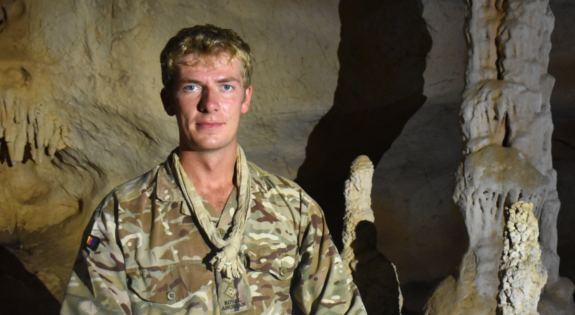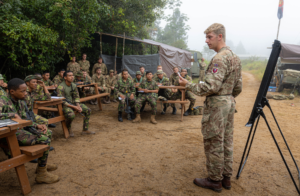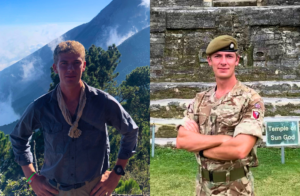News
November 1st 2023
Welcome to the jungle: Leicester student recalls life-changing British Army deployment to Belize
Within 48 hours of submitting his dissertation, Lieutenant Rob Blackman received a life-changing phone call out of the blue.
“How would you like to deploy to Belize for 8 months?” asked the Adjutant of 2 Company, Royal Anglian Regiment – Lt Blackman’s British Army Reserve unit in Leicester.
The 24-year-old student took minutes to decide and weeks later in September 2022, he was on a plane to Central America.
Now, with his boots back on British soil after working alongside soldiers from all over the world and exploring the dense jungle on what became a 10-month mobilisation, Lt Blackman has been reflecting on his first deployment as an Army Reservist.
The former University of Leicester student said: “I was only given 4 weeks’ notice to fly out – it was all flash and bang, to be honest.
“My family were quite surprised at my news. I shared it on my family chat and they were like ‘What, where has this come from?’ As well as the shock and surprise they were excited and proud, wondering what I would get up to.
“I had a lot of pre-conceptions about going. As my first deployment I was quite anxious and worried about whether, as a Reservist, I could keep up the pace. But as soon as I got there the worries and anxieties were crushed.”
Britain’s Reserve Forces play a crucial role in national security, from countering security threats, peacekeeping, and humanitarian efforts abroad to supporting communities at home.
On average, an Army Reservist makes an annual commitment of around 27 days or more spread over drill nights at their local centre, training weekends, and an annual camp, all of which they are paid for. They can also, as in Lt Blackman’s case, be deployed around the world.
Price Barracks
The international relations graduate was stationed at the British Army Training and Support Unit Belize (BATSUB) at Price Barracks, close to the country’s Caribbean shoreline in savannah grasslands.
As an Operations Officer, he was the key point of contact between the British garrison and both the Belize Defence Force (BDF), which is also based at the barracks, and other country’s visiting military personnel.
Countries send soldiers to BATSUB for jungle warfare training. They learn how to survive, live and fight in a jungle and also spend time training and sharing their expertise with the local BDF.
Lt Blackman was responsible for organising pre-exercise recces for visiting parties and overseeing the movements of hundreds of troops in and out of BATSUB during training exercises. As the main point of contact, he would be on hand to answer any questions.
Due to his position, Lt Blackman sprang into action when news of a category two hurricane in the area broke.
He said: “We had a hurricane sweep through camp. Luckily, it wasn’t too severe. But a few buildings had their roofs ripped off, trees were knocked down, there was severe flooding on the coast and a lot of locals lost their houses.
“We knew the hurricane was coming a week prior and so every day there would be an update on movements, weather paths, whether the hurricane was growing bigger or smaller, and the effects it could have on Belize.
“As the Liaison Officer for the Belize Defence Force at the time, I was liaising with them and preparing to attach to them in the event of a serious humanitarian relief effort, with the British Army on standby to help, just in case. Although we made preparations, the Belize Defence Force was able to cope.”
Dangers all around
As well as the hurricanes and humidity levels as high as 100%, there are dangerous creatures such as frogs, spiders and snakes that call the Central American jungle home.
The austere environment is relentless, with high risks of infection and some soldiers having to be evacuated after developing sepsis from small cuts. Such is the risk, that shaving is banned in the jungle.
Despite these dangers, the deep jungle is where Lt Blackman gravitated towards wherever there was an opportunity. He even spent 26 days living amongst the diverse wildlife on exercise with the Royal Anglian Regiment – what he describes as the most challenging yet his favourite part of the deployment.
He said: “Opportunities to go to these hard, tropical environments are rare. I knew I wanted to get as much time in the jungle as possible to learn from the locals and so I really got stuck in there with them and made the most of the environment.
“Going out with trackers, learning about the jungle, the flora, the fauna, what you can wear, what you can eat and how, herbal remedies – I found just basically learning how to live in a jungle interesting.”
Scuba diving in Belize, a world-class destination with the second largest barrier reef in the world, and competing in one the country’s biggest sporting events, the 4-day canoe marathon called La Ruta Maya, were other highlights.

Lt Blackman competing in La Ruta Maya.
‘Just do it’
But it wasn’t all fun and games. Lt Blackman, who returned home in May, admits being cut off from friends and family for 10 months was tough, although the close-knit community of the 40 or so permanent and temporary personnel at BATSUB made it easier.
Lt Blackman, who has been a Reservist since joining the East Midlands University Officers Training Corps in 2017, said: “My time at BATSUB was made by the people I was working with. It could have been a lot harder if they were difficult to work with. Luckily, everyone got on and that sense of community made it a great opportunity. It helped me grow and I thank them for that.”
He added: “The deployment is one of a few challenges I’ve had in my career where I feel I have made an impact. It’s one of the reasons I joined the Reserves, to help people, to have a purpose, and to fulfil that purpose. My deployment to Belize is one of a few times where I feel like what I’m doing really mattered, where I felt valued.”
Lt Blackman had the following advice for anyone looking to join the Army Reserves.
“Just do it. At the end of the day, if it doesn’t work out no one will look down on you. There’s only benefit and gain from joining. The opportunity for adventure and to try new things is there, it’s what you make of it.”
Fred Hopkins is the Head of Engagement at East Midlands Reserve Forces and Cadets Association, which promotes and supports Reserve Forces and Cadets in the region.
He added: “From speaking with a number of Reservists, what is abundantly clear is the sense of belonging, companionship and certainty of finding your place in the world that comes with joining the Reserves. The skills and life-expanding opportunities are unparalleled within almost any other form of employment.”



